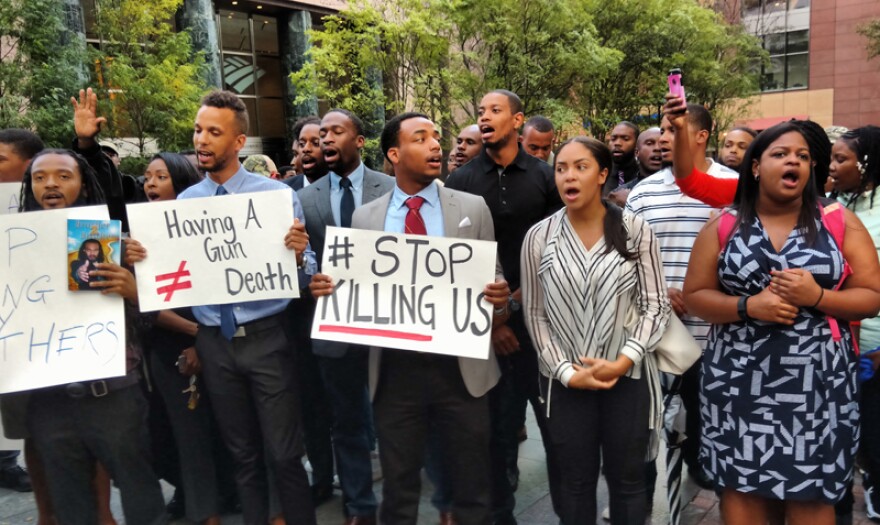Charlotte Mecklenburg Police Department's actions in the aftermath of the Keith Lamont Scott shooting are about to face an outside review. A Washington, D.C., group called The Police Foundation will conduct the review. In this report, WFAE’s David Boraks looks at some of The Police Foundation’s history and what we can - and can’t – expect from the assessment of CMPD.
The Police Foundation has been around since 1970, when it was founded by the Ford Foundation to study how to improve policing in the U.S. The group’s president, Jim Beeurmann, says cities and police departments hire the foundation for its expertise ... and its independence.

“We do not represent police officers, or police chiefs or sheriffs. We are a science based organization whose only constituency is the truth as we can understand it,” Bueermann said.
The foundation has a good reputation, said Seth Stoughton, who studies police regulation at the University of South Carolina law school.
“So when it provides recommendations, it's typically not seen as partisan or channeling any particular constituency. There may be a little more buy-in, when the Police Foundation issues a report, because it's not seen - and very properly should not be seen - as a partisan effort to promote any particular agenda,” Stoughton said.
Police Foundation reports often examine broad trends and tactics, such as using drones for community policing, how foot patrols improve community engagement, or how legalizing marijuana in some states is affecting police departments.
And it’s sometimes brought in after high-profile incidents, such as the terrorist attack in San Bernardino, California, a year ago; the police shooting and protests in Ferguson, Missouri, last year; and police shootings in North Charleston.
Bueermann describes the group's mission as better policing through science.
“We do rigorous scientific evaluation of policing strategies. We do critical incident reviews and we provide technical assistance to police departments and their communities across the country,” he said.
In Ferguson, it was St. Louis County police who responded to protests. The Police Foundation examined that response. Its report was critical at times, among other things calling for better training, better planning for mass demonstrations, changes in traffic stop procedures to avoid racial profiling, and reducing the use of force.
It also recommended broader cultural changes – such as hiring more minorities and adjusting promotional practices that seem to favor officers with advanced weapons and tactical training.
So now The Police Foundation is coming to Charlotte, under a $379,504 contract the City Council approved last month. Assistant City Manager Ann Wall says the foundation works in three phases:
- First, the review team will set up a community advisory board.
- Then it will hold small meetings with citizens on how to improve police-community relations
- “And the third place they look at is related to how the police department interacted with the demonstrations when they took place following the shooting of Keith Scott,” Wall said during the Nov. 14 meeting
The review will not include an in-depth analysis of that shooting, though that's something the city could have asked for. A city spokeswoman says that was the job of the State Bureau of Investigation. Based on those findings, the district attorney recently decided not to charge the officer who shot Scott.
To some, not examining the Scott shooting itself is an omission. Corine Mack of the Charlotte chapter of the NAACP says she doesn't buy the official account that Keith Scott was shot by one officer – even though the evidence shows that is the case. She wants an outside review of some kind.
“In that instance alone, there was a need for an independent federal investigation, outside the scope of anyone who may have relationships with the folks here in Charlotte,” Mack said.
CMPD's critics also want the foundation to examine why officers didn't try to de-escalate the confrontation with Scott. That also won’t be part of the review, though the foundation will look at de-escalation policies and training more broadly.
That’s something Police Chief Kerr Putney says he welcomes.
“De-escalation runs throughout all of our training, all of our educational process for new employees and current officers. I think the nuances (are) what we want the foundation to focus on and give us some feedback on that maybe your policy, your broader policy might miss,” Putney said in an October interview with WFAE.
Once The Police Foundation review begins, there will be public meetings, smaller "listening sessions” and, eventually, a report with recommendations.
The group’s president, Bueermann, says the goal is to strengthen police-community relations before another incident.
“Looking at the mechanisms that are in place in that unique community to create those relationships is something that we look at and if we think they're lacking, we'll make recommendations about volunteer programs, or community outreach, for instance. There may be recommendations about the tactics that are used,” Bueermann said.

But will Charlotte take the foundation's advice? The University of South Carolina’s Seth Stoughton said there's no guarantee.
“In some communities, the reforms are adopted and really taken to heart,” he said. “In some communities, reforms can be pretty superficial. And in some communities, reform suggestions are dismissed as impractical, or for a variety of political or economic reasons.”
City council member Ed Driggs said before the council approved the contract that he expects recommendations for improvement.
“I hope that out of this study will come a genuine critique, and that there won't be an impression created that all it was a validation of what we’re already doing,” he said.
The review will start in the coming weeks. It’s expected to take three to six months.
RELATED LINKS
The Police Foundation website, http://www.policefoundation.org







